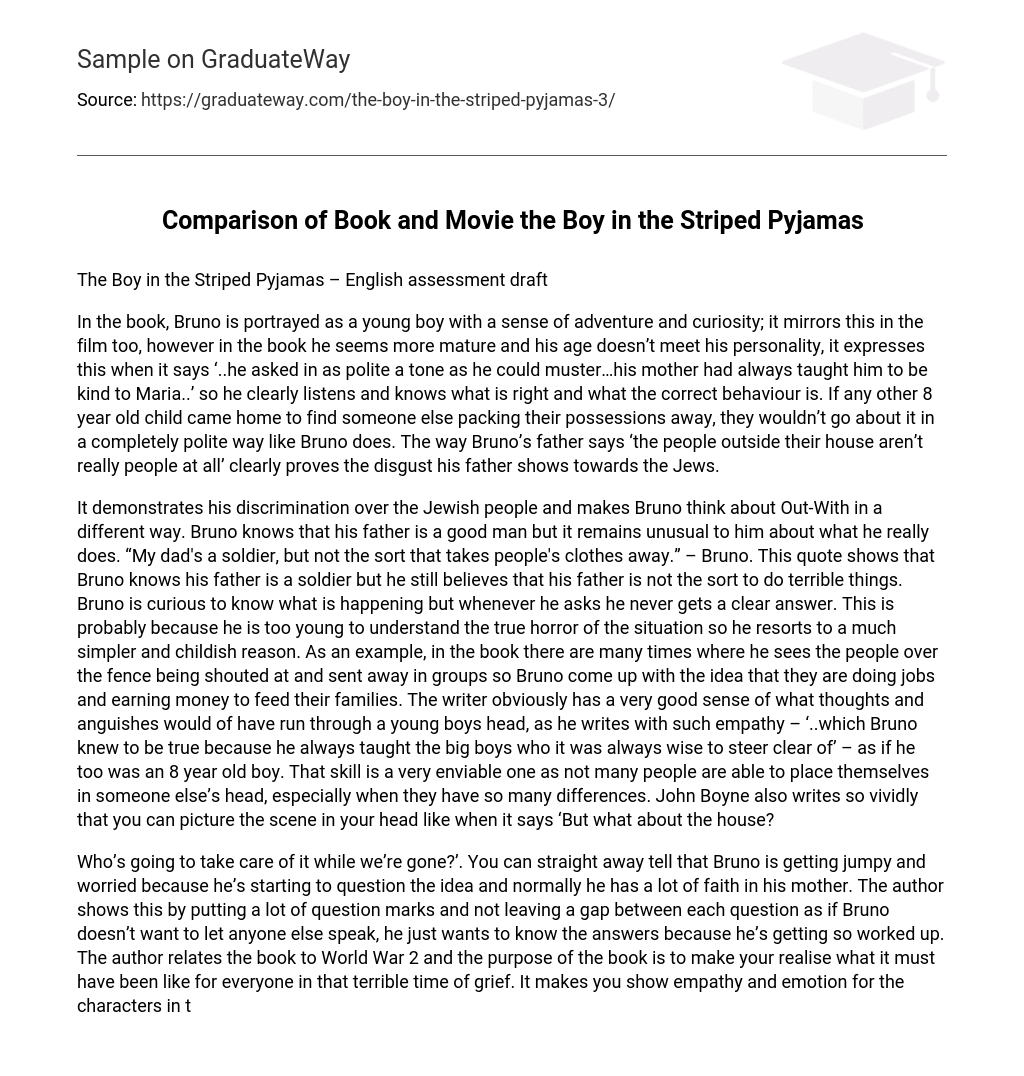The Boy in the Striped Pyjamas – English assessment draft
In the book, Bruno is portrayed as a young boy with a sense of adventure and curiosity; it mirrors this in the film too, however in the book he seems more mature and his age doesn’t meet his personality, it expresses this when it says ‘..he asked in as polite a tone as he could muster…his mother had always taught him to be kind to Maria..’ so he clearly listens and knows what is right and what the correct behaviour is. If any other 8 year old child came home to find someone else packing their possessions away, they wouldn’t go about it in a completely polite way like Bruno does. The way Bruno’s father says ‘the people outside their house aren’t really people at all’ clearly proves the disgust his father shows towards the Jews.
It demonstrates his discrimination over the Jewish people and makes Bruno think about Out-With in a different way. Bruno knows that his father is a good man but it remains unusual to him about what he really does. “My dad’s a soldier, but not the sort that takes people’s clothes away.” – Bruno. This quote shows that Bruno knows his father is a soldier but he still believes that his father is not the sort to do terrible things. Bruno is curious to know what is happening but whenever he asks he never gets a clear answer. This is probably because he is too young to understand the true horror of the situation so he resorts to a much simpler and childish reason. As an example, in the book there are many times where he sees the people over the fence being shouted at and sent away in groups so Bruno come up with the idea that they are doing jobs and earning money to feed their families. The writer obviously has a very good sense of what thoughts and anguishes would of have run through a young boys head, as he writes with such empathy – ‘..which Bruno knew to be true because he always taught the big boys who it was always wise to steer clear of’ – as if he too was an 8 year old boy. That skill is a very enviable one as not many people are able to place themselves in someone else’s head, especially when they have so many differences. John Boyne also writes so vividly that you can picture the scene in your head like when it says ‘But what about the house?
Who’s going to take care of it while we’re gone?’. You can straight away tell that Bruno is getting jumpy and worried because he’s starting to question the idea and normally he has a lot of faith in his mother. The author shows this by putting a lot of question marks and not leaving a gap between each question as if Bruno doesn’t want to let anyone else speak, he just wants to know the answers because he’s getting so worked up. The author relates the book to World War 2 and the purpose of the book is to make your realise what it must have been like for everyone in that terrible time of grief. It makes you show empathy and emotion for the characters in the book because you get so attached to them. Obviously the book is from Bruno’s point of view, but the film makes show empathy for almost everybody in the book, especially Shmuel and Bruno. The Boy in the Striped Pyjamas follows the normal structure of a novel. In the first few chapters the author describes the setting and who the family is, followed by the storyline where Bruno and his family move to Out-With and Bruno discovers the concentration camp and makes friends with Shmuel. In conclusion to this, I think the author presents the book in an extremely interesting way, making you want to keep reading and never put the book down. I enjoyed this book greatly, and though there were times my emotions were all over the place, I would love to read it again. I hope John Boyne continues to write such captivating novels and I will be on the lookout for his next release.





